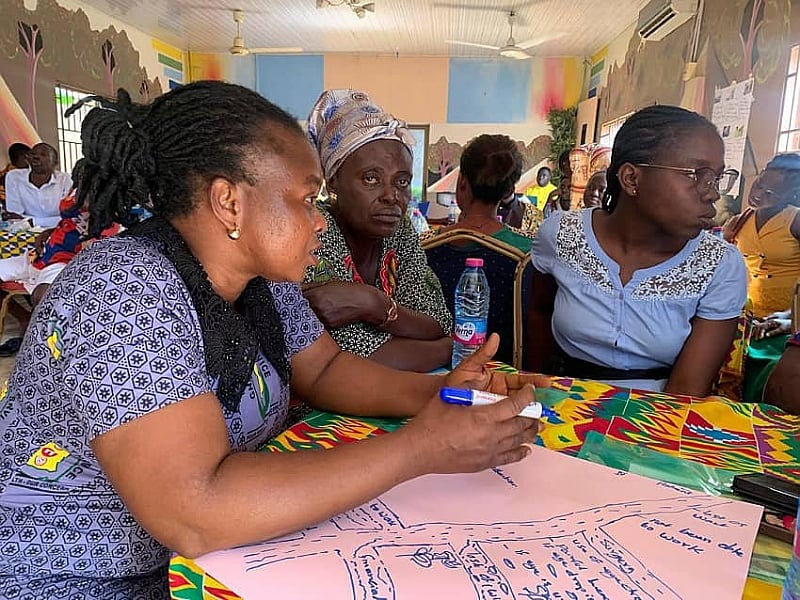Empowering Voices, Amplifying Needs: Ghana NCD Alliance Equips Individuals Living with Non-Communicable Diseases to Advocate for Change
The Ghana NCD Alliance, in partnership with the ANAQ Foundation for Sickle Cell and Nutrition, spearheaded a transformative two-day training workshop in the Ahafo Region, specifically designed to empower individuals living with non-communicable diseases (NCDs). Titled "Our Views, Our Voices," this initiative, inspired by the Global NCD Alliance, aimed to nurture the advocacy skills of those directly affected by NCDs, enabling them to become powerful agents of change. Held in Duayaw Nkwanta on January 24th and 25th, 2025, the workshop sought to not only build capacity among those living with NCDs but also to amplify their voices and highlight the urgent need for action to address the challenges they face in Ghana and globally. The workshop underscored the importance of integrating the lived experiences of individuals wrestling with NCDs into policy discussions and healthcare strategies.
The driving force behind this initiative was the profound understanding that individuals living with NCDs possess invaluable insights into the realities of these conditions. Their experiences, often marked by personal struggles, healthcare system navigation challenges, and societal stigmas, provide a crucial perspective often missing from policy dialogues. By providing these individuals with training and a platform to share their stories, the "Our Views, Our Voices" workshop sought to bridge this gap and ensure that the concerns and needs of those most affected are central to the fight against NCDs. This participatory approach acknowledges that effective solutions require not only medical expertise but also the lived wisdom of those directly impacted by these diseases.
Ama Nyarko Attefuah Quainoo, president and founder of the ANAQ Foundation and Board Secretary of the Ghana NCD Alliance, emphasized the urgency of the situation, highlighting the silent toll that NCDs like cancers, strokes, asthma, and diabetes are taking on lives. She stressed the critical need for a comprehensive national policy to tackle this growing health crisis. Quainoo’s powerful message underscored the workshop’s core objective: to bring the voices of those living with NCDs to the forefront, demanding attention from the government and the public alike. This clarion call aimed to catalyze action and ensure that the lived experiences of individuals with NCDs are not overlooked but rather inform policy decisions and resource allocation.
The training program equipped participants with the tools and skills needed to advocate effectively, extending their reach beyond their personal experiences to educate healthcare workers and communities. This ripple effect, inspired by the "train the trainer" model, aimed to create a network of informed advocates who could share their stories, raise awareness, and foster a collective effort to combat NCDs. By equipping individuals living with NCDs to be active participants in their own healthcare journey and empowering them to become educators and advocates, the workshop aimed to create a sustainable and impactful change within the healthcare system and the community at large.
The workshop served as a stark reminder of the multiple burdens faced by people living with NCDs, including stigma, discrimination, and limited access to healthcare, education, and employment. These systemic challenges, often woven into the fabric of societal attitudes and healthcare infrastructures, violate fundamental human rights and freedoms, demanding urgent redress. Quainoo urged the government to take concrete action, including the development and implementation of comprehensive national NCD policies and plans, alongside strengthening the healthcare system to ensure equitable access to quality care. The call to action emphasized the fundamental right of all individuals to access quality healthcare, irrespective of their health status, and stressed the government’s responsibility to protect and promote this right.
Labram Musah, National Coordinator of the Ghana NCD Alliance, painted a grim global picture, highlighting NCDs as the leading cause of death worldwide, responsible for over 41 million deaths annually, representing over 70% of all fatalities. He emphasized the largely preventable nature of these diseases, pointing to the crucial role of interventions targeting risk factors such as alcohol and tobacco consumption, unhealthy diets, air pollution, and lack of physical activity. Despite the preventable nature of these diseases, Musah lamented the significant gap in access to treatment, care, and support for NCDs, emphasizing the inadequate attention and resources allocated by the government. His urgent plea for a "whole government and whole society" approach underscored the need for a multi-sectoral response, urging greater government investment, particularly in preventative measures. This call to action emphasized that combating NCDs requires a collaborative effort involving not only the healthcare sector but also other governmental departments, civil society organizations, and the community as a whole. By addressing the underlying social determinants of health, creating supportive environments, and empowering individuals to make healthy choices, Ghana can make significant strides in reducing the burden of NCDs and improving the health and well-being of its population.


